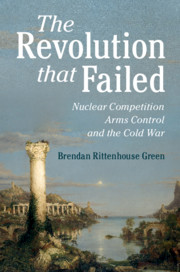Book contents
- The Revolution that Failed
- The Revolution that Failed
- Copyright page
- Dedication
- Epigraph
- Contents
- Figures and Tables
- Acknowledgments
- Introduction
- 1 The Nuclear Revolution Revisited
- 2 The Delicacy of the Nuclear Balance
- 3 Comparative Constitutional Fitness
- 4 Testing the Argument against Its Competitors
- 5 Nixon and the Origins of Renewed Nuclear Competition, 1969–1971
- 6 Nixon, Ford, and Accelerating Nuclear Competition, 1971–1976
- 7 The Rise of Nuclear Warfighting, 1972–1976
- 8 Carter and the Climax of the Arms Race, 1977–1979
- 9 The Revolution that Failed
- Index
3 - Comparative Constitutional Fitness
Published online by Cambridge University Press: 26 February 2020
- The Revolution that Failed
- The Revolution that Failed
- Copyright page
- Dedication
- Epigraph
- Contents
- Figures and Tables
- Acknowledgments
- Introduction
- 1 The Nuclear Revolution Revisited
- 2 The Delicacy of the Nuclear Balance
- 3 Comparative Constitutional Fitness
- 4 Testing the Argument against Its Competitors
- 5 Nixon and the Origins of Renewed Nuclear Competition, 1969–1971
- 6 Nixon, Ford, and Accelerating Nuclear Competition, 1971–1976
- 7 The Rise of Nuclear Warfighting, 1972–1976
- 8 Carter and the Climax of the Arms Race, 1977–1979
- 9 The Revolution that Failed
- Index
Summary
The crisis bargaining incentives discussed in Chapters 1 and 2 seem unlikely, by themselves, to explain the intensity of the late Cold War nuclear competition, or the failure of arms control to ameliorate it. The nuclear balance was delicate – not fragile. Why would the superpowers pay such high costs, and potentially court dangerous political spirals that risked crisis and war, just for the long shot benefit of escaping stalemate or preventing their adversary from doing so? Theoretically, technological or perceptual uncertainties about nuclear stalemate could be consistent with either minimal or severe military competition. Arms control that regulates the technical and perceptual environment might be feasible, and much less costly, than competitive alternatives. Some general account is needed that explains how states will choose a mix of competitive and cooperative nuclear policies, and thus the degree and type of nuclear competition that ensues.
- Type
- Chapter
- Information
- The Revolution that FailedNuclear Competition, Arms Control, and the Cold War, pp. 48 - 65Publisher: Cambridge University PressPrint publication year: 2020

